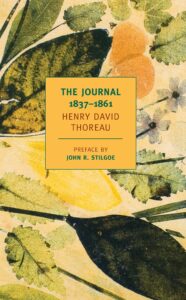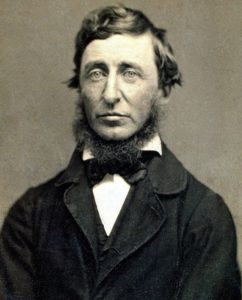Thoreau on Knowing vs. Seeing and What It Takes to Apprehend Reality Unblinded by Our Preconceptions
INSPIRATIONAL, 27 Jul 2020
Maria Popova | Brain Pickings – TRANSCEND Media Service
 “We hear and apprehend only what we already half know.”
“We hear and apprehend only what we already half know.”
“No really creative transformation can possibly be effected by human beings,” physicist David Bohm wrote in examining the nature of creativity, “unless they are in the creative state of mind that is generally sensitive to the differences that always exist between the observed fact and any preconceived ideas, however noble, beautiful, and magnificent they may seem to be.”
And yet, stranded in the purgatory between objective and subjective reality, we are often too blinded by our preconceptions to receive facts as we encounter them, the raw material of reality — something Galileo considered the greatest enemy of critical thinking as he was launching his epoch-making crusade against delusion.
Perched in time between Galileo and Bohm is an improbable kindred spirit: Henry David Thoreau (July 12, 1817–May 6, 1862), who contemplates what it takes to shift from knowing to seeing, from prejudgment-primed interpretation to apprehension of pure reality, in a passage from The Journal of Henry David Thoreau, 1837–1861 (public library) — a book I continue to consider an existential Bible of secular scripture, replete with the great transcendentalist philosopher and poet’s wisdom on the myth of productivity, the greatest gift of growing old, the sacredness of public libraries, the creative benefits of keeping a diary, and the only worthwhile definition of success.
In a journal entry from the thick of winter in 1860, just before he became bedridden with what would be his final illness, the forty-three-year-old Thoreau writes:
A man receives only what he is ready to receive… We hear and apprehend only what we already half know. If there is something which does not concern me, which is out of my line, which by experience or by genius my attention is not drawn to, however novel and remarkable it may be, if it is spoken we hear it not, if it is written, we read it not, or if we read it, it does not detain us. Every man thus tracks himself through life, in all his hearing and reading and observation and traveling. His observations make a chain. The phenomenon or fact that cannot in any wise be linked with the rest which he has observed, he does not observe. By and by we may be ready to receive what we cannot receive now.
Complement this particular portion of the endlessly rewarding Journal of Henry David Thoreau with Hegel on the peril of fixed opinions and electromagnetism pioneer Michael Faraday on curing our propensity for self-deception, then revisit Thoreau on the difference between an artisan, an artist, and a genius, the spiritual rewards of winter walks, and how to use civil disobedience to advance justice.
_______________________________________
 Brain Pickings is the brain child of Maria Popova, an interestingness hunter-gatherer and curious mind at large obsessed with combinatorial creativity who also writes for Wired UK and The Atlantic, among others, and is an MIT Futures of Entertainment Fellow. She has gotten occasional help from a handful of guest contributors. Email: brainpicker@brainpickings.org
Brain Pickings is the brain child of Maria Popova, an interestingness hunter-gatherer and curious mind at large obsessed with combinatorial creativity who also writes for Wired UK and The Atlantic, among others, and is an MIT Futures of Entertainment Fellow. She has gotten occasional help from a handful of guest contributors. Email: brainpicker@brainpickings.org
Go to Original – brainpickings.org
Tags: Henry David Thoreau, Inspirational
DISCLAIMER: The statements, views and opinions expressed in pieces republished here are solely those of the authors and do not necessarily represent those of TMS. In accordance with title 17 U.S.C. section 107, this material is distributed without profit to those who have expressed a prior interest in receiving the included information for research and educational purposes. TMS has no affiliation whatsoever with the originator of this article nor is TMS endorsed or sponsored by the originator. “GO TO ORIGINAL” links are provided as a convenience to our readers and allow for verification of authenticity. However, as originating pages are often updated by their originating host sites, the versions posted may not match the versions our readers view when clicking the “GO TO ORIGINAL” links. This site contains copyrighted material the use of which has not always been specifically authorized by the copyright owner. We are making such material available in our efforts to advance understanding of environmental, political, human rights, economic, democracy, scientific, and social justice issues, etc. We believe this constitutes a ‘fair use’ of any such copyrighted material as provided for in section 107 of the US Copyright Law. In accordance with Title 17 U.S.C. Section 107, the material on this site is distributed without profit to those who have expressed a prior interest in receiving the included information for research and educational purposes. For more information go to: http://www.law.cornell.edu/uscode/17/107.shtml. If you wish to use copyrighted material from this site for purposes of your own that go beyond ‘fair use’, you must obtain permission from the copyright owner.
